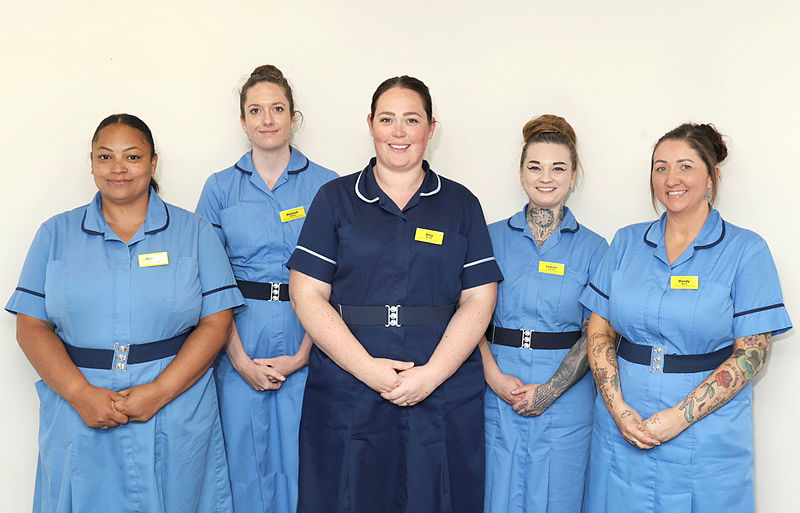A “five-star” service to treat Walsall patients’ leg wounds is celebrating its first anniversary after dealing with more than 1,000 referrals.
Since Walsall Healthcare NHS Trust’s Tissue Viability in the Community service started on July 24, 2023, hundreds of wounds have either healed or improved.
A total number of 1,105 patients have been referred to the service, 573 of which have been for leg issues.
Some 301 out of the 573 have been dopplered (a test using ultrasound to assess blood flow in large arteries and veins), and 341 have healed within two weeks and 405 have healed between two and six weeks.
The other 532 referrals are patients with pressure ulcers, trauma to anywhere else on the body, negative pressure dressings and surgical wounds.
The service, based at Jubilee House, Bloxwich Lane in Walsall, started because of the growing numbers of people requiring treatment for lower leg wounds, due to District Nursing capacity issues. This meant assessments and investigations were delayed.
It was decided to start seeing patients continuously for up to two weeks, where all assessments are completed. Then if needed, patients are referred to the District Nursing team which will continue the care implemented.
That team has the availability to step them back up to the Tissue Viability Corporate Team if their condition deteriorates.
Amy Bevan, 34, Quality Lead for Tissue Viability in the Community, leads a team of five Nurses – Hannah Oakley, Melanie Watkiss, Amanda Ward, Lauren Yarnold and Amelia-Rose Fiaz.
“We ensure in the first two weeks patients have all assessments done, including a doppler, and they are put in the correct dressings (bandages, hosiery or wraps) to give them a better quality of life and the best chance of a speedy recovery,” said Amy (pictured centre, in dark uniform).
“This service aims to improve patient outcomes, and to reduce prescription costs by putting patients in the right dressings at the right time, because that’s what’s going to heal them. It also aims to improve healing rates in the Walsall community.
“Then if we need to, we can pass their care to the District Nurses to continue the current dressing regime.”
The service expanded to receive all pressure wounds, moisture lesions and complex vac. This is where the patient has negative pressure dressings, such as foam or gauze in the wound, and they are connected to a portable machine, so avoiding visiting hospital.
“Since increasing our criteria we have been able to support the District Nurses further by see these patients and putting a care plan in place for them to heal and continue with their treatment at home,” added Amy, who has been at Walsall Healthcare for 10 years.
“Some patients may come out of hospital with a care plan for Tissue Viability Corporate, and it is continued by us when they get home for two weeks to ensure all documentation and assessments are completed before going to the District Nursing team.
“Some patients have long-term conditions such as heart failure and lymphoedema that are unable to doppler. However, some patients we doppler and are unable to use compression therapies to aid healing and these are referred to Vascular Services via the GP, while some are under active investigations that stop them being dopplered.”
Feedback has been hugely positive.
“We’ve had more than 100 friends and family feedback, and all of them have been five-star ratings,” said Amy.
“They have said they can’t thank us enough, that legs have started to heal from stagnant wounds and we were so quick and speedy.”
One patient said: “The service has been amazing – I’ve had great care.”
Another advantage of the service is it is self-sufficient. Amy is qualified to prescribe and two of her staff can prescribe some drugs too.
“Being able to prescribe means we can treat patients quickly without delays caused by further referrals,” added Amy.
“We’ve got everything we need during those two weeks to either get the patient on the right tracks or healed.”
The Tissue Viability Corporate Team, based at Walsall Manor Hospital, sees 50 per cent of its patients in the community and 50 per cent in acute (hospital). These include the ‘step-up’ of deteriorating wounds for patients needing extra assessment or investigations, referred by District Nurses.

